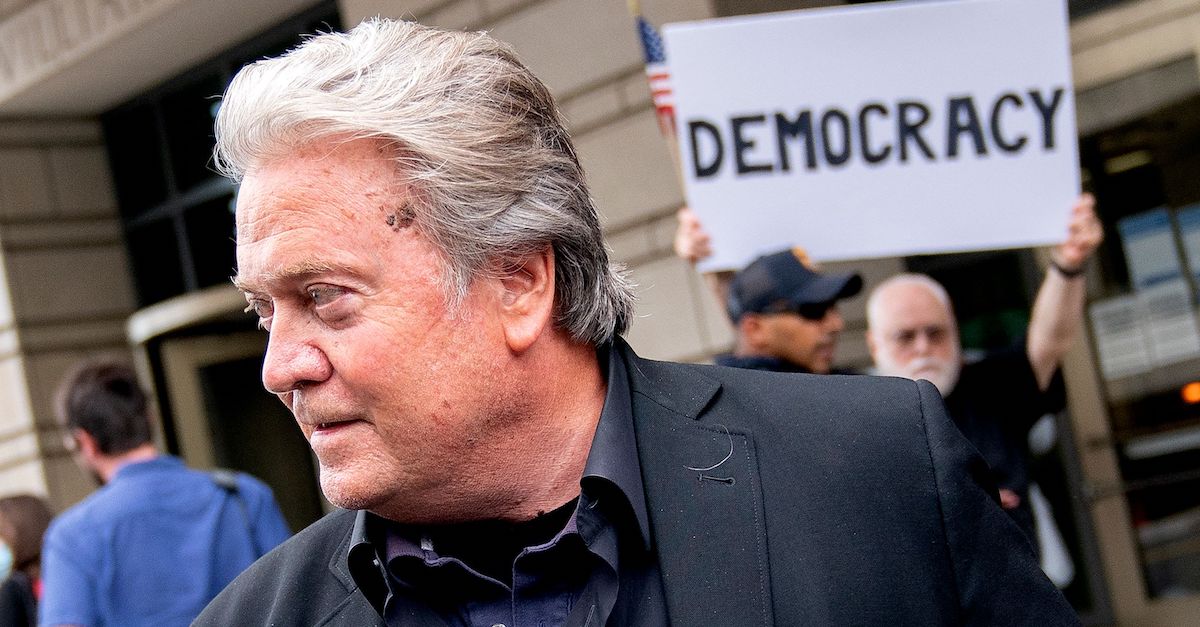
Former White House Chief Strategist Steve Bannon departs the United States District Court House on the first day of jury selection in his trial for contempt of Congress, in Washington, DC, on July 18, 2022.
Former President Donald Trump’s ex-chief strategist Steve Bannon was convicted on Friday following a brief jury trial on two counts of contempt of Congress. The D.C. jury reportedly took less than three hours to deliberate.
U.S. Attorney’s office for the District of Columbia celebrated the speedy guilty verdicts.
“The subpoena to Stephen Bannon was not an invitation that could be rejected or ignored,” U.S. Attorney Matthew M. Graves said in a statement. “Mr. Bannon had an obligation to appear before the House Select Committee to give testimony and provide documents. His refusal to do so was deliberate and now a jury has found that he must pay the consequences.”
The Jan. 6 Committee did not immediately respond to Law&Crime’s email requesting comment.
When first charged with flouting the Jan. 6 Committee’s demands for his testimony and documents, Bannon vowed to make his counteroffensive painful for the government. He told reporters in a press conference to turn his trial into the “misdemeanor from Hell,” but the Trump loyalist ultimately had few arrows in his quiver to deliver on that pledge.
Before trial, U.S. District Judge Carl J. Nichols, a Trump appointee, reportedly struck down most of his proposed defenses. Bannon wanted to attack the credibility of the House committee that served him with a subpoena. His attorneys also wanted to argue that the Jan. 6 Committee did not have the power to investigate the matter and challenge the validity of the subpoena. Earlier Friday, the lawyers expressed concerns about whether jurors watched Thursday’s “highly inflammatory” committee hearing.
For prosecutors, this amounted to an impermissible argument for “jury nullification,” in which a panel acquits a defendant that it believes to be guilty on the law.
According to Politico, Judge Nichols systematically shredded those defenses at a pretrial hearing that left Bannon’s legal team despondent.
“What’s the point in going to trial here if there are no defenses?” Bannon’s attorney David Schoen reportedly said on July 11.
Nichols reportedly agreed with that remark, but he found that the government only had to prove Bannon’s defiance was deliberate and not an accident.
Bannon also wanted to call House Speaker Nancy Pelosi, Jan. 6 Committee Chairman Bennie Thompson (D-Miss.) and others. The House’s attorney Douglas Letter described that a political stunt, and the judge agreed that inquiries into their motives was forbidden by the Constitution’s speech or debate clause.
The ex-Trump strategist also failed multiple times to delay his trial, claiming a jury would be prejudiced by the Jan. 6 Committee’s widely viewed public hearings. Bannon appeared to be an ancillary figure in the first several hearings, but he had a stronger presence in a recent hearing. The committee played a clip from Bannon’s podcast “War Room” on Jan. 5, 2021, when he told listeners “All hell will break loose tomorrow.”
Former federal prosecutor Mitchell Epner, now a partner at Rottenberg Lipman Rich PC, predicted Bannon would have little room to mount an appeal before having to serve his sentence fully.
“Bannon never put up a legal defense, only an attack on the legitimacy of the process,” Epner noted. “He is now facing a mandatory minimum of 30 days in jail. It will take 3 months to get to sentencing. The question is whether Judge Nichols will grant bail pending appeal. Absent bail, Bannon will have served his time long before an appeal could be briefed, let alone decided.”
Sentencing has been slated for Oct. 21, 2022.
Both Thompson and Vice Chair Liz Cheney (R-Wy0.) have long said Bannon’s remarks suggested foreknowledge of the Jan. 6 attack.
“It’s not going to happen like you think it’s going to happen,” Bannon said on his broadcast. “OK, it’s going to be quite extraordinarily different.”
“So many people said, ‘Man, if I was in a revolution, I would be in Washington,’” Bannon added later. “Well, this is your time in history.”
At their July 12 hearing, the Jan. 6 Committee revealed that Trump called Bannon twice before that podcast. Trump previously pardoned Bannon — but not his co-defendants — of conspiring to defraud donors of We Build the Wall, a crowd-funding effort to construct a barrier along U.S.-Mexico border. Prosecutors say that Bannon pocketed some of the money despite promising donors every cent would go toward construction. Two of his co-defendants pleaded guilty, and the other is heading toward a retrial.
Each count of conviction carries a maximum sentence of up to one year in jail and a maximum fine of $100,000.
(Photo by STEFANI REYNOLDS/AFP via Getty Images)